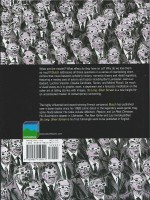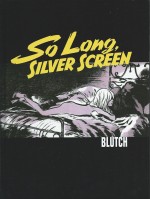

By Blutch, translated by Edward Gauvin (Picturebox)
ISBN: 978-0-9851595-1-1
Cinema was the paramount art form of the 20th century and, in France more than any other country and society, the “Movie†is celebrated, venerated and critically examined as no other creation of man.
This lyrical, declamatory, harshly imaginative and lyrically introspective collection of short tales – as much stern self-analysis as autobiographical exploration – by pre-eminent cartoonist and illustrator Blutch examines the creator’s relationship to and lifelong shaping by the magic of celluloid fantasies and the mythical icons who made and populated them.
Christian Hincker was born in Strasbourg in 1967. He grew up there and studied at the famous School of Decorative Arts before beginning his spectacular career into comics after winning a competition in the magazine Fluide Glacial in 1988.
His strips for the prominent avant-garde adult comic include light humour serials Pecos Jim, Johnny Staccato and Mademoiselle Sunnymoon, whilst his features for other publishers range from adventure series such as La Lettre Américaine & Mitchum, the groundbreaking Peplum (a Gay tragedy set in Ancient Rome and based on Petronius’ Satyricon), Vitesse Moderne – his first graphic novel foray into full colour art – and his whimsical autobiography Le Petit Christian (‘The Small Christian’) amongst a host of tales.
As an illustrator and collaborator with other creators, his uniquely unassuming visual questioning has appeared in such disparate places as Libération, The New Yorker and Les Inrockuptibles as well as on strips such as Trondheim & Sfar’s Dungeon saga or Congratulations Rancho (with Jean-Louis Capron). He has even dabbled in film making with the animated short Peur(s) du noir – Fear(s) of the Dark to you and me…
In this stunning hardback edition – the prolific craftsman’s first to make the jump to English, and designed by US comicbook genius David Mazzucchelli – Hincker inserts himself Robert Crumb-like into a series of uncompromising dissertations and conversational comic dialogues about the consumption, effects of and responses to the fantasy-land of movies.
Moreover his expansive, enticing arguments are packed with character roles, cameos, walk-ons and special guest appearances by the likes of Hollywood greats such as William Holden, Burt Lancaster, Ava Gardner, Kirk Douglas, King Kong, Tony Curtis, Charlton Heston, Orson Welles, Johnny Weissmuller – and Cheetah – as well as Euro-stars like Luis Buñuel, Claudia Cardinale, Jean-Luc Godard, Alain Delon, Susan Travers, and probably more I don’t recognise…
‘Adieu Paul Newman’ opens the show with typical movie staging, sexual tension and even violence as the creator remarks on the passing of a legend through his interactions with the girl of his dreams and the woman who puts up with him, after which the happy faraway land of cloistered childhood is revisited through adult eyes in ‘The Swiss Family Robinson’.
That broken fantasy realm poses its own imponderable questions now…
‘A High Wind in Jamaica’ examines the cruel trick of growing old, impotent and useless under the full and unforgiving public gaze by fixating on the brutish vitality of Burt Lancaster through his 46 years of film-making, whilst ‘A Portrait of Luchino Visconti’ provides seven views of the master’s works, and ‘Shutting You Up’ then deals with the author’s early romantic dalliances – when hot blooded teens in the comforting cinema darkness never got to see more than fifteen minutes of any film…
‘Women in Film – A Modern Olympia’ explores the harsh treatment and idolatry of women in movies with telling and evocative contributions from Marilyn Monroe, Jane Russell, Rita Hayworth, Anne Margaret, Betty Grable, Maureen O’Sullivan and others. Blutch convincingly ruminates on how technology moved furtive solo imaginings onto walls of light, and invented democratised pornography, whilst turning women into unattainable property and sanitising if not advocating violence against them…
The querulous tirade of romantic, regretful, puzzled meditations on an incomprehensibly still-beloved addiction concludes with a seductive trip to ‘The Imaginary Museum’, and a treatise on a train (going into that inevitable tunnel) on the inescapable influence of prolific French superstar Michel Piccoli and the beloved slavery of the artist Blutch for that other art form…
Challenging, enticing and genuinely thought-provoking, this delicious cartoon voyage with a keenly enquiring companion – who has all of the questions but so few answers – is a sheer joy that no grown-up fan of graphic narratives and motion pictures can afford to miss.
© DARGAUD 2011 by Blutch. All rights reserved. Translation © 2013 Edward Gauvin.
